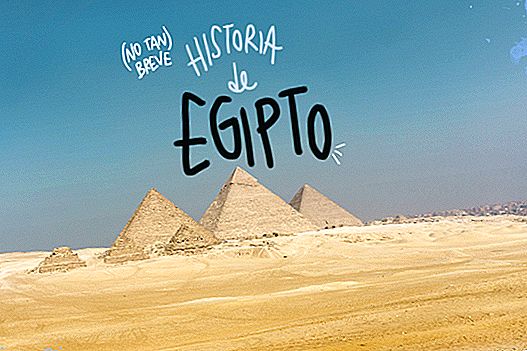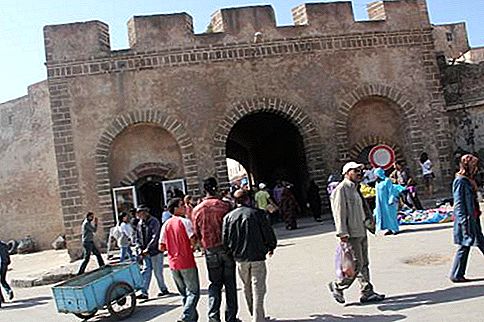
“Men fear time, but time fears the pyramids", Is that the egyptian history dates back to about 5,000 years ago (almost nothing). If you close your eyes and think of Egypt, surely the pyramids, the majestic temples on the banks of the Nile, the pharaohs, the Sphinx ... and finally, the golden age of one of the oldest civilizations on the planet. But if you close them a little more, you will also see images of the Arab Spring, revolutions and struggles. It is the other side of the history of this country, which is certainly worth telling. So we go there, we start ournot so brief summary of the history of Egypt.
They can be clearly differentiated 4 stages in history from the country:
- Ancient Egypt
- Roman Greek Period
- Arab Period
- Modern age
Before talking about each of them, let us tell you something important, without which it will be difficult to understand the rest.
Herodotus already said: Egypt is a gift from the Nile. Without the help of this river, the Egyptian civilization could not have reached such a level of progress and, most likely, would have succumbed in time. Egypt without the Nile would simply be an immense and dusty desert, but luckily, that watercourse was primarily responsible for the greatness of this country that, just by naming it, puts goosebumps on more than one traveler.
The Nile not only represented a perfect and fast way of communication, but its floods made possible a cultivation system that fed the population. The most amazing thing is that the Nile was experiencing two floods that left the banks full of silt, and therefore left the land super fertile and conducive to cultivation, (not by chance the Romans referred to Egypt as "the barn of the world"). These natural floods had an inconvenience: they were unpredictable. To control the water level and prevent flooding in the Lower Nile area, the huge Aswan dam was built between 1958 and 1970.
Now, let's talk more about the different stages of the history of Egypt.
OLD EGYPT (approx. 3,000 - 332a.C.)
To speak of the time of ancient Egypt is to speak of pharaohs, pyramids, priests, gods, temples, victories and defeats. It is to talk about the “dynasties“, Of which there were a total of 33, each formed by rulers who came from the same family. It is to speak of a time that became eternal, which went down in history as one of the key moments of the destiny of the world.
Life in ancient Egypt
As we will see below, this era can be divided into 4 different historical moments, each with its own characteristics. But there are some common features:
- Ancient Egypt was a society agricultural, yes, but the development of arts and sciences It was brutal (especially in algebra, geometry, writing and astronomy).
- In the beginning, the Pharaoh it was considered as the reincarnation of God Horus. Later he stops being seen as a divine figure, but is still revered as someone with immense, yet deadly power. Each pharaoh had a wife, priests, visors and generals.
- The use of Egyptian hieroglyphs begins at the dawn of this era, but it was not until the late nineteenth century, when Champollion managed to decipher them with the help of the Rosetta Stone.
Religion and the Gods of Ancient Egypt
It was one polytheistic religion who practiced the worship of several gods, the most important being these:
- Ammon: the God of the Gods, the creator.
- Mut: wife of Amun, represented by a vulture.
- Ra: the God of the sun, who shines every day, was represented with a hawk's head and a dollar disk.
- Thot: the lunar God, who measured time. Thanks to him, Osiris, Seth, Isis and Nephthys were born.
- Osiris: the God of the resurrection was the one who accompanied the dead in the transit to their new life. He was killed by Seth
- Seth: brother and murderer of Osiris. God of darkness and evil.
- Isis: the Goddess of motherhood, wife of Osiris
- Horus: represented by a hawk, son of Osiris and Isis. It was said that the pharaohs were the reincarnation of Horus.
- Sobek: the God of fertility and the Nile, represented with a crocodile head.
- Anubis: with the head of a jackal, it was he who led the dead to the divine court.
- Tot: God with the head of ibis, protector of writing, music and knowledge.
- Nut: The Goddess of the night, was represented as a celestial vault full of stars.
- Maat: The Goddess of justice was always represented with an ostrich feather on her head.
The times of Ancient Egypt:
We can divide this stage into 4 phases:
ANCIENT EMPIRE (2635 - 2155 BC)
It is the moment when the two Egyptians (the High, which went from Aswan to Cairo, and the Low, which went from Cairo to the Delta), they unify and begins to be governed by the calls "Dynasties" The city of Memphis .
Now is when the pharaoh figure (Below we talk more about this). The most important pharaohs are: Zoser, Cheops, Kefren and Micerino.
It is also known as the era of the pyramids since it is when they begin to build these architectural works that many mysteries hide (such as Saqqara, the oldest and the Pyramids of Giza).
Over the centuries, the pharaohs are losing power, especially because of the inability of many of them to govern and it is not until the X dynasty that they return to strength.
MIDDLE EMPIRE (2155 - 1570 BC)
The most important city of the time isThebes (the current Luxor), so much that capital is chosen. It is a time of wars and conquests, but also of defeats and losses. A remarkable fact is the conquest of part of Egypt by thehicsos, which moved the capital to Avaris.
In the Middle Kingdom something curious happens, there is a evolution of religious ideas: to begin with, the pharaoh is a mortal being, far from the previous idea that related to a divine being. Of course, with bravery, intelligence and unusual ability. The most important pharaohs of the time were: Amenemhat I and Sesostris III.
NEW EMPIRE (1570 - 1070 BC)
After a busy time, Egypt returns “to the normal”, The unity between Upper and Lower Egypt is restored and the capital returns toThebes (Luxor) In the New Kingdom, advances and ideas are developed that ultimately had great importance in the history of Egypt. Something never seen before is that women assume an elevated role in monarchical life: Hatshepsut she was the first female pharaoh and at the same time another very influential female figure emerges, we talk about Nefertiti.
It is the time of the XVIII-XX dynasties, with Tutankhamen and Ramses II being the most important pharaohs. Ramses II He started some of the most amazing temples ever built, like Abu Simbel. And why is it so important Tutankhamen? In fact, he only reigned a few years, but what made his name great was the enormous treasure found in his grave, one of the greatest of all time.
INTERMEDIATE - LATE PERIOD (1070-332 B.C.)
It is the last period of the dynasties (from the XXI to the XXX). Egypt little by little is losing power, Thebes ceases to be capital and becomes Tanis First and then Bubastis.
525 BC It is a key year, Persians They invade the country. When, years later, in 332 B.C. Alexander the Great arrives in Egypt, a new era begins.
For Alexander the Great It was not difficult to conquer Egypt: the people were unhappy with the Persian occupiers and supported him without difficulty. After expelling them and winning the favor of the Egyptians, he founded a city: Alexandria, which soon began to be one of the most important ports from all over the Mediterranean.
Alexander the Great was followed Ptolemy. In reality, the Greek mentality never fully prospered in Egypt: historians would later say that the Egyptian thought in images, the Greek in concepts. Still the Ptolemaic dynasty (within which we find the figure of Cleopatra VII, the last queen of Egypt) reigned almost 300 years.
A key date of this era is the 48 BC when Julius Caesar He arrives in Egypt, tired of the constant diatribes between Cleopatra VII and his brother (and husband) Ptolemy XIII. Long Story short: both wanted to reign, so they married to be legitimate rulers, but they never got along, so much that Julio Cesar had to intervene on more than one occasion. Finally he allies with Cleopatra, with which he also begins a love story. He takes her to Rome where, they say, she joins Marco Antonio, a military man considered the right arm of Julio Cesar who could become his successor. But it is not like that: Julio Cesar (who even had a son with Cleopatra) was killed and Cayo Julio César Octaviano legitimately succeeded him with the name of Augustus, first Roman emperor.
In 43 B.C. Augusto forms a triumvirate with Marco Antonio and Lépido, but only 10 years later, because of their ambitions, the emperor exiled Lépido and fought against Marco Antonio who ended up committing suicide (some say he did after hearing that Augusto had killed Cleopatra)
What happened to Cleopatra? There are different versions: an account that after trying to seduce Octavian and not getting it, committed suicide with the venomous bite of a snake. The other has the same end but a different cause: Octavian promised him that if he left Rome he would leave her alone. But it was not like that: he murdered one of his children and she, in pain, decided to take her own life. Anyway, after his death, Augustus entered Egypt and in 30 BC. the country officially becomes part of the Roman empire.
After the separation of the Roman Empire, it is part of the Byzantine Empire until the arrival of the Arabs.
Egypt was part of the Byzantine Empire until, in 641 A.D., the Arabs entered the country with all their strength and began to mold the egypt that we all know today. From this period we must highlight the figure of Saladin,One of the most important sultans in Arab history. He died in 1193 A.D.
In 1517 Egypt went on to become a ottoman province and his power fell considerably. In 1798 with a campaign of the same Napoleon, Egypt begins a brief colonial period (French and English). In 1922, Britain grants its de facto colony (it was since 1882), independence and created the Kingdom of Egypt, under a monarch.
This lasted until 1952 when one took place great revolution which overthrew the corrupt and dictatorial monarchy of King Farouk. The leader of this revolt was Gamal Abdel Nasser. On July 23, 1952, the democratic nation of Egypt was born, and Nasser became president of the country (he was until 1970, the date of his death).
The Nasser years are also the years of the dream of unifying all the Arab peoples and fighting the historic enemy (Israel), they are also years of agrarian reforms, the expulsion of the English from the Suez Canal and the immense project of the dam from Aswan. It also lost areas of the Sinai Peninsula and strengthened ties with the U.R.S.S.
The vice president followed Sadat, who changed the political course: he was more conciliatory with Israel and cooled relations with the U.R.S.S., bringing his position closer to that of the United States. In 1971, in addition, the name of the country becomes the Arab Republic of Egypt. In 1979 he accepted peace with Israel and signed, together with Israeli Prime Minister Begin and with American President Carter, the Camp David agreements. That earned him the Nobel Peace Prize but at the same time he was considered a traitor by the Islamist radicals (Egypt was the first Arab country to sign peace with Israel). Diedin fact in a attempt during a military parade on 19 in 1981.
Hosni Mubarak he was the vice president of Sadat then and became his successor until 2011, date that begins second Egyptian revolution, within the movement of the Arab Spring. What happened during the Mubarak years so that a relatively quiet country needed another revolution? Basically 3 things: the economic deterioration of the country increased substantially. The fact that Mubarak always tried mediate between the US, Israel and Arab countries neither did the radicals like anything (who attempted on more than one occasion against tourist objectives). And finally, the town was tired of so much corruption and demanded the establishment of a true democracy.
Mubarak, who throughout his mandate escaped dozens of attacks, was arrested by appropriation of public funds and guilty of ordering the death of numerous protesters during the revolution. In March 2017 he was acquitted of all charges and after spending 6 years in prison he was released. More info here.
Mohamed Morsi It was in 2012, the first democratically elected president in Egypt (his party, Muslim Brothers, won with about 51% of votes), but a year later, on July 3, 2013 he was imprisoned after a coup promoted by Abdul Fatah al-Sisi, the president of the country today. Currently, Morsi continues to serve his sentence (although he has avoided the death penalty).
The Islamist government of Morsi was quite tolerant towards the non-Muslim communities of the country, the problem came when he wanted to promulgate a law that protected the presidential figure (included virtually total legal immunity). The protests were not long in coming, for fear of a new dictatorship. That was when thousands of protesters they flooded the streets and the army, with Abdul Fatah al-Sisi in command, overthrew Morsi, jailing him.
Abdul Fatah al-Sisi he won in the following presidential elections, and he also did it in those of 2018, so today he is serving his second term as President. By the way, he won with 97% of the votes.
There are few who believe that with the arrival of Al-Sisi to power, a new authoritarian political model (Some say that even more than in the time of Mubarak). It seems that the new government has no problems in repress freedom of expression and there are thousands of people (journalists, supporters of Morsi, members of the Muslim Brotherhood) who have been imprisoned in almost subhuman conditions.
If there is no doubt that there is a very serious human rights crisis, it is also true that Al-Sisi has a lot of support: There are those who consider him as a hero, who knew how to save Egypt from political instability (Morsi's strongly Islamist tendencies did not like everyone. More info. Or so we read before traveling to the country, after talking with local people, the truth , the feeling is quite angry and disappointed. Hopefully the Egyptians will soon be able to enjoy political stability and real democracy.
Hopefully this (not so) brief history of egypt I could clarify some ideas. Of course, talking about such a broad topic is very complicated, and even more so when it comes to the country with the longest and most exciting history in the world.
* Photocredit: Shutterstock

Save on your trip
Flights Cheap to Egypt: bit.ly/2GbxfyJ
accommodation Cheap in Egypt: booki.ng/2G6Ys5C
Stay withAirbnb and get€ 25 discount: here
Activities and excursions in Egypt: bit.ly/2QD3tXR
Rent a car with the best discounts: bit.ly/2PxxcRn
Travel insurance IATI with a5% discount: bit.ly/29OSvKt
Books and travel guides: amzn.to/2SBJ5U8











